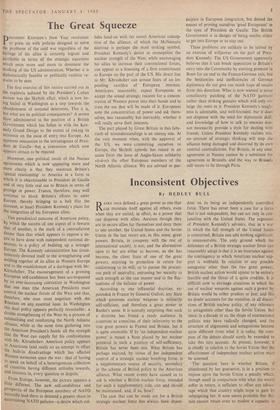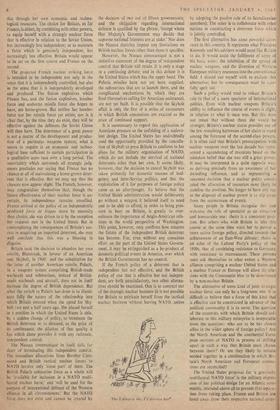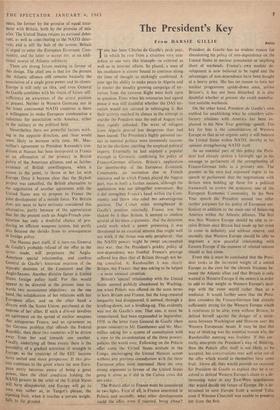Inconsistent Objectives
By HEDLEY BULL
Rn ANKE once defined a great power as one that can maintain itself against all others, even when they are united; in effect, as a power that can dispense with allies. Anxious though they are to secure allies for themselves and deny them to one another, the United States and the Soviet Union in the last resort are, in this sense, great powers. Britain, in company with the rest of international society, is not; and the alternatives open to her are either to become, as she has become, the client State of one of the great powers, enjoying its protection in return for conforming to its will; or to pursue the precari- ous path of neutrality, entrusting her security to such strength as she can muster and to the fluc- tuations of the balance of power.
According to one influential doctrine, ex- pounded in France by General Gallois, any State which possesses nuclear weapons is militarily self-sufficient, and therefore a great power in Ranke's sense. It is scarcely surprising that such a doctrine has found a ready audience in countries as conscious of their inferiority to the true great powers as France and Britain, but it is quite untenable. If by 'an independent nuclear power' is meant a State placed by her nuclear potential in such a position of self-sufficiency, Britain has never been one. What Britain has perhaps enjoyed, by virtue of her independent control of a strategic nuclear bombing force, is a supplementary source of security, secondary in the scheme of British policy to the American alliance. What recent events have caused us to ask is whether a British nuclear force, intended for such a supplementary role, can and should be maintained; and, if so, how?
The case that can be made out for a British strategic nuclear force has always been depen-
dent on its being an independently controlled force. There has never been a case for a force that is not independent, but can act only in con- junction with the United States. The argument of President Kennedy's advisers. that in a war in which the full strength of the United States • is committed, Britain can add nothing significant, is unanswerable. The only ground which the defenders of a British strategic nuclear force can reasonably adopt is that it is an insurance against the contingency in which American nuclear sup- port is withheld. In relation to any possible antagonist other than the two great powers, British nuclear action would appear to be entirely feasible and the threat of it quite credible. It ks difficult now to envisage situations in which the use of nuclear weapons, against such a power by Britain would be either prudent or just; and this no doubt accounts for the omission, in all discus- , ' sions of British nuclear policy, of any reference to antagonists other than the Soviet Union. But since, in a decade or so, the shape of international politics may have radically changed, and the structure of alignments and antagonisms become quite different from what it is today, the com- pass of the debate should surely be extended to take this into account. At present, however, it is chiefly in relation to the Soviet Union that the effectiveness of independent nuclear action must be assessed.
' The question here is whether Britain, 'if abandoned by her guarantor, is in a position to
impose upon the Soviet Union a penalty which, though small in comparison with what she would suffer in return, is sufficient to offset any advan- tage which that country might hope to gain by subjugating her. It now seems probable 'that Bri- tain cannot retain even so modest a capacity as this through her own economic and techno- logical resources. The choice for Britain, as for France, is either, by combining with other powers, to equip herself with a strategic nuclear force that is effective in relation to the Soviet Union, but increasingly less independent; or to maintain a force which is genuinely independent, but increasingly less effective. Britain would appear to be set on the first course and France on the second.
The projected French nuclear striking force is intended to be independent not only in the sense that it is independently controlled, but also in the sense that it is independently developed and produced. The fission explosives which France has, and the fusion explosives, bomber force and seaborne missile force she hopes to have, are home-grown. But neither her bomber force nor her missile force yet exists; nor is it dear that, by the time they do exist, they will be effective against the defences the Soviet Union will then have. The deterrence of a great power is not a matter of the development and produc- tion of a particular weapons system; what it seems to require is an economic and techno- logical base sufficient to sustain participation in a qualitative arms race over a long period. The uncertainty which surrounds all strategic judg- ments precludes our saying that France has no chance at all of maintaining a home-grown deter- rent that is effective. But we may say that the chances now appear slight. The French, however, may congratulate themselves that, though the future effectiveness of their nuclear force is un- certain, its independence remains unsullied. France arrived at the policy of an independently produced force de frappe more by necessity than choice; she was driven to it by the reception her requests met in the United States. But in contemplating the consequences of Britain's suc- cess in acquiring an imported deterrent, she may well conclude that this was a blessing in disguise.
Britain took the decision to abandon her own missile, Bluestreak, in favour of an American one, Skybolt, in 1960: and the substitution for the latter of another American missile, Polaris, in a weapons system comprising British-made warheads and submarines, instead of British- made warheads and aircraft, does not in itself increase the degree of British dependence. But what the switch to Polaris has done is to illumi- nate fully the nature of the relationship into which Britain entered when she opted for Sky- bolt two and a half years ago. She placed herself in a position in which the United States is able, by a sudden change of policy, to terminate the British deterrent or to demand, as the price of its continuance, the dilution of that quality it has which alone provides it with any rationale, independent control.
The Nassau conununique in itself falls far short of terminating this independent control. The immediate allocations from Bomber Com- mand and British tactical nuclear forces to NATO involve only 'some part' of them. The British Polaris submarine force as a whole will be 'available for inclusion in a NATO multi- lateral nuclear force,' and 'will be used for the purpose of international defence of the Western alliance in all circumstances.' But the NATO force does not exist and cannot be created by the decision of two out of fifteen governments; and the obligation regarding international defence is qualified by the phrase, 'except where Her Majesty's Government may decide that supreme national interests are at stake.' Nor does the Nassau doctrine impose any limitations on British nuclear forces other than those it specifies.
However, the Nassau communiqué is not a definitive statement of the degree of independent control that Britain will retain. It is only a stage in a continuing debate; and in this debate it is the United States which has the upper hand. The Polaris missiles have not yet been supplied; the submarines that are to launch them, and the complicated mechanisms by which they are fired (themselves calling for American assistance), are not yet built. It is possible that the Skybolt affair is only the first of a series of encounters in which British concessions are exacted as the price of continued support.
It is unnecessary to regard this application of American pressure as the unfolding of a malevo- lent design. The United States has undoubtedly used the opportunity provided by the cancella- tion of Skybolt to press Britain to conform to her plans for the military organisation of NATO, which do not include the survival of national deterrents other than her own. It seems likely, however, that the decision to cancel Skybolt was taken primarily for domestic reasons of bud- getary and inter-Service politics, and that the exploitation of it for purposes of foreign policy came as an afterthought. To believe that the United States administration would deliberately go without a weapon it believed itself to need and to be able to afford, in order to bring pres- sure to bear on Britain, is greatly to over- estimate the importance of Anglo-American rela- tions in the world perspective of Washington. This point, however, only confirms how tenuous the future of the independent British deterrent has become. For, even without any conscious effort on the part of the United States Govern- ment, it may be extinguished as a by-product of domestic political events in America, over which the British Government has no control.
If the French policy of a deterrent that is independent but not effective, and the British policy of one that is effective but not indepen- dent, are both unsatisfactory, two other alterna- tives should be examined. One is to contract out of the strategic nuclear business (it is not possible for Britain to extricate herself from the tactical nuclear business without leaving NATO, unless 'She'll divorce me, divorce herr
by adopting the passIve role of its Scandinavian members). The other is to collaborate with -other nations in constructing a deterrent force vt is jointly controlled.
The first alternative has some powerful advo- cates in this country. It represents what President Kennedy and his advisers would most like Britain to do. It would assist the fulfilment of some of his basic aims: the inhibition of the spread of nuclear weapons, and the diversion of We::::etn European military resources into the conventional field. I should not myself wish to exclude this alternative; but its consequences must be care- fully spelt out.
Such a policy would tend to reduce Britain's role to that of a mere spectator of international politics. Even with nuclear weapons Britain's ability to influence the course of events is slight, in relation to what it once was. But this does not mean that without them she would he stronger; Britain's nuclear status provides one of the few remaining buttresses of her claim to stand among the foremost of the second-class powers. It is often said that Britain's preoccupation with nuclear weapons over the last decade has repre- sented a squandering of resources based on the mistaken belief that she was still a great power. It may be interpreted in a quite opposite way, as deriving precisely from an awareness of her dwindling influence, and as representing a reasoned decision that a nuclear policy ,.,,r,,ii- tuted the allocation of resources most likely to stabilise the position. No longer to have any say in the disposal of nuclear power is to slip away from the mainstream of events.
Some people in Britain recognise this and welcome the role of spectator as an attractive and honourable one: theirs is a consistent posi- tion. But others who wish Britain to take this course at the same time want her to pursue a more active foreign policy, directed towards the achievement of an East-West détente: theirs is an echo of the Labour Party's policy of the 1930s, that of combining resistance to Germany with resistance to rearmament. These persons must ask themselves to what extent a Western alliance comprising a nuclear United States and a nuclear France or Europe will allow its rela- tions with the Communist bloc to be determined by a non-nuclear Britain.
The alternative of some kind of joint strategic nuclear force can only be a long-term one. It is difficult to believe that a force of this kind that is effective can be constructed in advance of the political community it is to serve. The question of the countries with which Britain should col-• laborate in this military enterprise is inseparable from the question: who are to be her closest allies in the wider sphere of foreign policy? Are the North American and the continental Euro- pean sections of NATO in process of drifting apart in such a way, that Britain must choose between thein? Or are they likely to remain welded together in a combination 'in whiCh Bri tain's North American and European connec- tions are reconciled?
The United States pfoposal for 'a genunely multilateral NATO force' is the military expres- sion of her political design for an Atlantic com- munity, intended above all to prevent that sepa ra- tion from taking place. France and Britain are lured away from their respective national deter- rents, the former by the promise of equal treat- ment with Britain, both by the promise of mis- siles. The United States retains its national deter- rent, as well as contributing to the NATO deter- rent, and is still the hub of the system. Britain is urged to enter the European Economic Com- munity, and the latter to accept her. as an addi- tional source of Atlantic solidarity
There are strong forces making in favour of this design. The chief one is that for the present the Atlantic alliance still remains basically the association of a single great power and its clients. Europe is still only an idea, and even General de Gaulle combines with his vision of future self- sufficiency an awareness of the actual position at present. Neither in Western Germany nor in the lesser continental NATO countries is there a willingness to make European combination a substitute for association with America, either in the military or the political field.
Nevertheless there are powerful factors work- ing in the opposite direction, and these would seem likely to increase with time. Mr. Mac- millan's agreement to President Kennedy's con- ditions at Nassau has been interpreted in France as an affirmation of the primacy in British policy of the American alliance, and as further evidence of British unwillingness, when it comes to the point, to throw in her lot with Europe. Once it became clear that the Skybolt project was cancelled, the British alternative to the negotiation of another agreement with the United States was to propose to France the joint development of a missile force. Yet Britain does not seem to have seriously considered this alternative, partly because of the appreciation that for the present such an Anglo-French com- bination has only a doubtful chance of pro- ducing an efficient weapons system. but partly also because she shrinks from its oifinsequences in foreign policy.
The Nassau pact itself, if it surv,ves General de Gaulle's probable refusal of the offer in the terms made, will perpetuate the Anglo- American special relationship. and confirm General de Gaulle's historical intuition of the separate destinies of the Continent and the Anglo-Saxons. Another divisive factor is United States foreign policy itself. For this would appear to be directed at the present time to- wards two inconsistent objectives: on the one hand, the solidification of her relations with her European allies; and on the other hand a de'tente with the Soviet Union, purchased at the expense of her allies. If such a &Ware involves an agreement on the spread of nuclear weapons that antagonises France, and an agreement on the German problem that offends the Federal Republic, then these two countries will be driven away from her and towards one another. Finally, underlying all these events there is the Possibility of a gradual accretion of strength in Europe, as the countries of the EEC become more united and more prosperous. If this pro- cess continues to the point where the new Euro- pean entity becomes aware of being a great power, then the chief condition holding the NATO powers in the orbit of the United States Will have disappeared, and Europe will go its own way rather as, in Turgot's phrase, the ripening fruit, when it reaches a certain weight, falls to the ground.
































 Previous page
Previous page